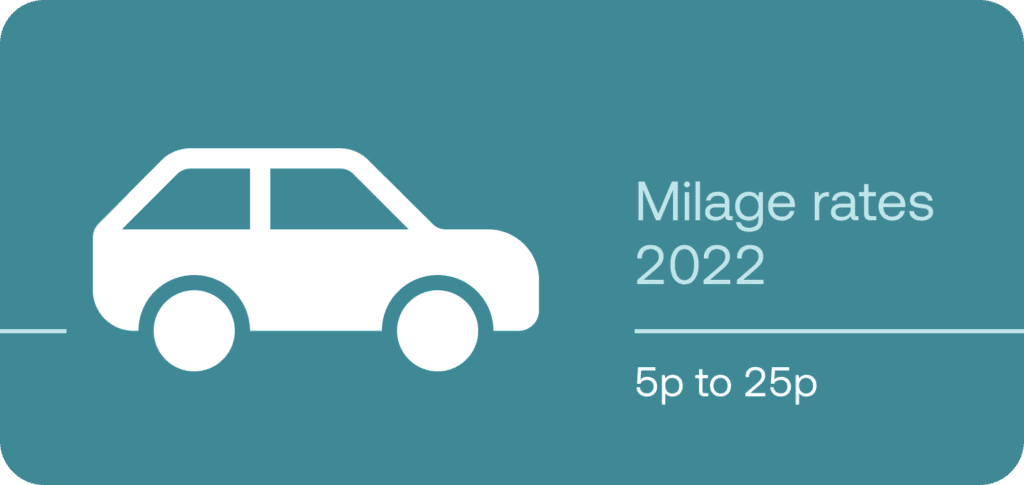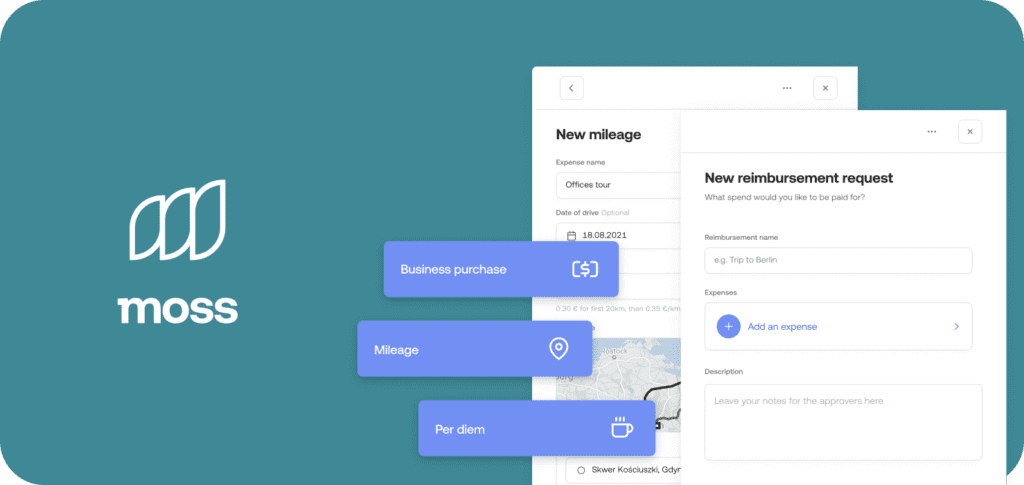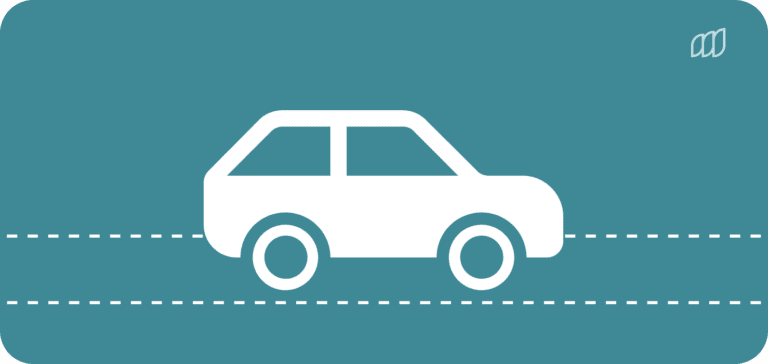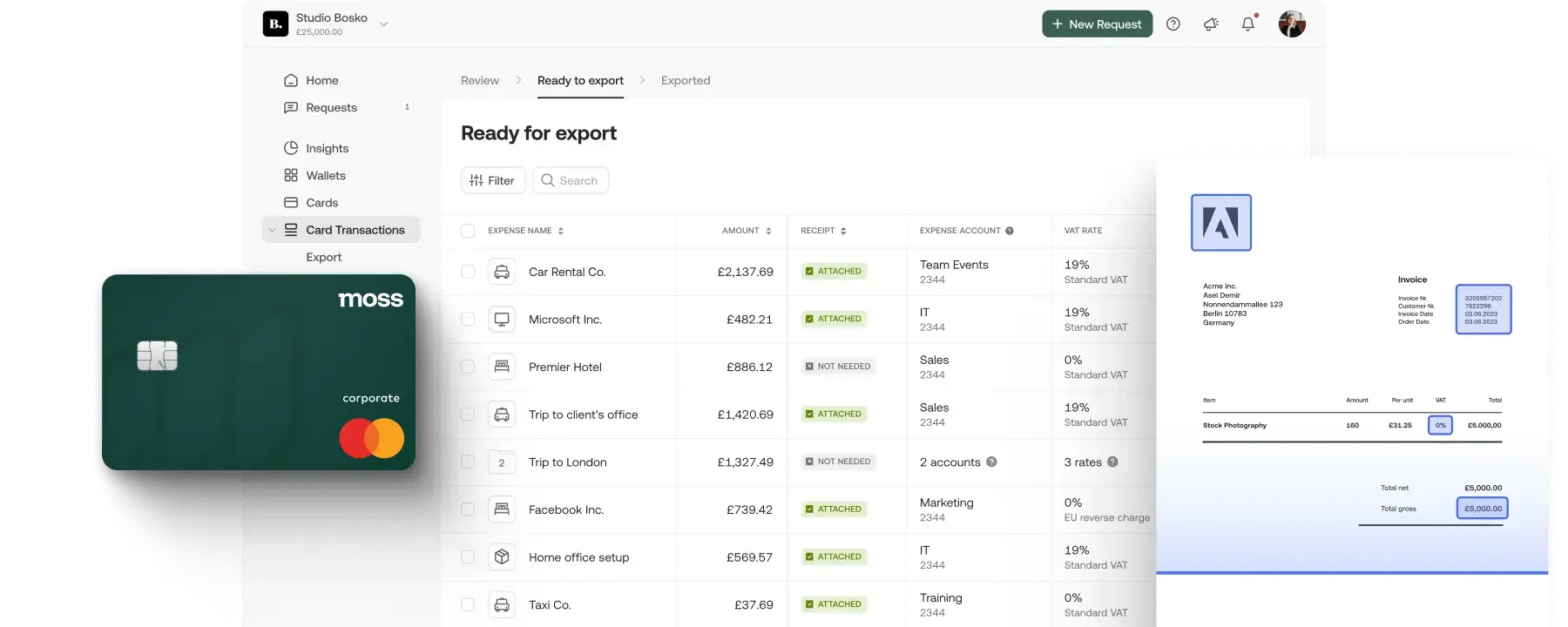Company cars are a great benefit for employees and businesses. But, when it comes to calculating travel expenses, the experience of using a company car can be a little less pleasant. We made this guide to help put all the confusion to rest. Learn what company car mileage rates are, why they’re necessary, and why every company and working individual can profit from a better understanding of the issue.
What are company car mileage rates?

Company cars give employees a convenient means of transport that they can use to travel to work, and simplify business trips or personal rides. Therefore, it’s usually considered a wonderful gesture of trust and gratitude to hand over the keys to a leased vehicle. In return, the business profits from higher employee motivation and flexibility. The tricky thing is: Employees often need to pay for petrol themselves and then get reimbursed for work trips at a later date. These petrol station stops can quickly rack up some serious business expenses.
In general, companies are more than willing to pay for them. But, instead of simply reimbursing the amount on the receipt, they will often opt for a tax-free solution. This is where the company car mileage rates set up by the government come into play. HMRC has the following rule: Corporate expenses are not subject to tax or Class 1A National Insurance fees if there is no profit made from the expense. This means: companies do not get taxed for the one-for-one reimbursement of business expenses, and can even reduce taxes.
To stay in line with HMRC regulations, most businesses adhere to the company car mileage rates which are also often called advisory fuel rates. These have proven to be an efficient way to handle fuel rates in accounting and HMRC. Instead of taking every make and car model into account, these rates apply to the vast majority of vehicles driven in the UK.
When do company car mileage rates apply?
So, to sum up the question in which cases company car mileage rates apply, two common scenarios are important for companies and employees alike.
- Reimbursement for business travel expenses in a company car driven by an employee
- Repayment of fuel costs when an employee uses a company car for private trips
However, the advisory fuel rates are not set in stone. They do not apply for vans. Hybrid cars, on the other hand, can be treated as cars fueled by diesel or petrol. Also good to know for employers: Reclaiming input VAT is only possible with a valid receipt handed in by the employee.
Employers can also apply their own rate, which can be useful for very efficient cars or when the business travel cost is higher than the HMRC guideline rate. They should keep in mind that a higher rate without fully explaining the higher cost per mile must be treated as taxable profit. The amount is also considered earning for Class 1 National Insurance.
Why do advisory fuel rates change?

Considering the current state of the world, technology has to develop quickly to keep up with demand and fuel alternatives. On top of that, fuel and energy prices are constantly changing due to the ups and downs of the world market, availability, and political situations.
As inflation hits consumers, advisory fuel rates need to adapt, too. That is why HMRC is evaluating on a quarterly basis if rates need to be adjusted to reflect the current financial situation of taxpayers.
HMRC company car mileage rates 2022
On 1 June 2022, HMRC issued new advisory fuel rates for company cars. It was possible to use the company car mileage rates from March 2022 until 30 June 2022. Advisory fuel rates might change again in September 2022.
| Engine size | Petrol | Diesel | LPG | Fully electric |
| 1,400cc or less | 14p | 9p | 5p | |
| 1,600cc or less | 13p | 5p | ||
| 1,401cc – 2,000cc | 17p | 11p | 5p | |
| 1,601cc – 2,000cc | 16p | 5p | ||
| Over 2,000cc | 25p | 19p | 16p | 5p |
But how does HMRC calculate the advisory fuel rate? An important factor is MPG (the miles per gallon value) which is taken from manufacturers’ information. This is taken into relation to how many specific car models are corporate-owned. The applied MPG is 15 percent lower than average to reflect realistic driving conditions and optimised fuel efficiency.
Of course, the current fuel price is also taken into account. This is provided by the Department for Business, Energy, and Industrial Strategy. Regarding the LPG price (liquified petroleum gas), the Automobile Association is handing out data.
What are the benefits of a company car?

Driving a company car comes with plenty of benefits for employees, especially when the employer allows private use. In contrast to a car allowance, where money is added to the annual salary to pay for fuel, maintenance, or a new set of tires, team members do not have to maintain, buy or lease a car of their own. The business takes care of all things related to the car, so the employee can simply enjoy driving it. After a few years, they usually receive a new model, too, so thanks to corporate leasing contracts, team members can even profit from driving the most efficient cars on the market.
It is ideal for commuters who travel long distances every day and cannot or do not want to own a personal vehicle. However, employees need to consider the benefit-in-kind. Luxurious models with high CO2 emissions might result in higher taxes than a more efficient car. So we suggest that employees should have a say in the car selection to avoid unnecessary financial pressure.
Why company cars can be the right decision for businesses
Having a corporate fleet of cars can boost a business thanks to more flexible work hours and quick interactions with clients. Of course, every company should crunch their numbers to see whether leasing or even buying company cars really makes sense. The following factors are essential to gather information on the costs:
- Monthly lease payment or one-time payment
- Fuel costs
- Insurance
- Taxes and registration costs
- Maintenance and repairs for damages
The total can be compared to the estimated cost per month for each team member’s possible mileage reimbursement. But numbers are not the only factor in this equation. If a business has trouble finding skilled, resilient, and highly motivated employees, offering a company car might be the right way to go. In the long run, spending a few more pounds can be the best decision a CEO has ever made if it means that team members enjoy working for them and their vision. Moreover, company cars can make for free advertisement. Stickers or magnets on the vehicle are seen by hundreds of people every day. A fleet of cars therefore can reach potential clients and partners alike.
What is the BIK car tax?
The BIK is short for benefit-in-kind. This tax affects employees who receive company benefits on top of their salary. The most prominent example is a company car that often can be used for private matters, as well. In those cases, employees will have to make a tax contribution by paying the BIK.
This company car tax can vary according to several factors: P11D value (the list price mentioned in the benefits and expenses form) and the car’s CO2 emissions. To calculate the company car or BIK tax, the P11D value is mandatory. This is multiplied by the BIK percentage banding and again multiplied by the individual tax band. To simplify the process, it is also possible to use a comprehensive online tax calculator.
Company car mileage rates: Moss is designed to keep track

Every successful business will come to a point in its development where financial duties become an overburdening task if not handled correctly. And with that, we mean implementing automated processes that help declutter and streamline workflows to the max. Moss gives companies the necessary tools so there is more time and space for innovative thinking and growth. How? By making reimbursement of business expenses easier than ever before.
Thanks to the implemented OCR scanning software, employees can simply take a picture from their petrol station receipts and upload it via the app. No proof of purchase gets lost or damaged as digital copies are securely saved, which paves the way for your company to reclaim VAT whenever possible. Every business can also decide to hand out an unlimited amount of corporate cards to make payments for business travel expenses even easier. Because with the help of credit or debit cards, no employee, not even freelancers, have to pay out-of-pocket, meaning that you save plenty of time on loads of reimbursement processes.
Thanks to our smart Xero interface, all data gets exported where it is needed for accounting– and decision-making. Managers can also use it to follow up with the current cash flow in real-time and use numbers to gain valuable insights. Choose the financially smart path with Moss—providing you with what companies really require is what drives us every day.
FAQs
With company car mileage rates, employees can get reimbursed for fuel payments. Companies do not profit from them, which is why reimbursement is tax-free. The rates are also used to calculate the amount of money for repayment when a company car is used privately.
HMRC is publishing the so-called advisory fuel rates on a quarterly basis, which are the same as company car mileage rates. However, these should not be confused with the HMRC mileage allowance, which applies for business trips with a private car.
On 1 June 2022, HMRC issued new advisory fuel rates. For businesses and their employees, It was possible to use the company car mileage rates from March 2022 until 30 June 2022. Advisory fuel rates will be reviewed again in September 2022.
The idea of publishing company car mileage rates has proven to be the most efficient way to reimburse or repay these specific business expenses. As fuel and energy prices are constantly changing and new technologies change the car industry, it is crucial to adapt the prices regularly.
Employees can profit from driving a company car if they are commuting to work or going on business trips several times a year. Businesses, on the other hand, can motivate their team members, profit from tax reductions, and even find better staff with the help of this great benefit.
If a company car is not very efficient and produces lots of CO2 emissions, the benefit-in-kind tax can be higher than with efficient and more sustainable solutions. Therefore, team members should check if they can handle the respective tax connected to the chosen vehicle.







